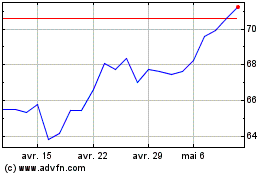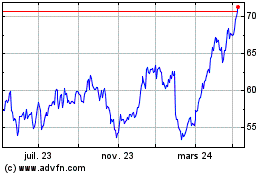Turkey Blocks Foreign Banks in Attempt to Stem Currency Slide
07 Mai 2020 - 8:41PM
Dow Jones News
By Avantika Chilkoti and Caitlin Ostroff
Turkey blocked three international banks from trading its
currency Thursday, an effort to stymie investors who are betting
that the country's weak financial standing will continue to
deteriorate.
Turkey's banking regulator said units of Citigroup Inc., BNP
Paribas SA and UBS Group AG can no longer process transactions
involving Turkish lira. It determined that the lenders had failed
to fulfill their liabilities in Turkish lira transactions with
Turkish banks. The watchdog didn't say how long the ban would
remain in force.
All three banks are international players in foreign-exchange
markets, helping investors and companies trade into and out of the
currencies, including the lira. The ban was issued hours after a
new regulation that gave the banking regulator, known as the BDDK,
increased powers to prosecute alleged market manipulation and the
publication of misleading information.
Representatives at UBS and BNP Paribas didn't immediately
respond to requests for comment. Citigroup declined to comment.
The Turkish currency hit a record low against the dollar earlier
Thursday before bouncing back slightly after the trading ban was
imposed. One U.S. dollar bought 7.1 lira, leaving the Turkish
currency up 1% for the day, but 20% weaker than at the start of the
year.
The slide in the lira reflects a troubling backdrop for the
Turkish economy. Heavily indebted and struggling for years to
contain high inflation, Turkey is now dealing with the impact of
the coronavirus both at home and in its biggest trading partner,
the European Union.
Banning foreign banks from trading the lira "sends a signal of
desperation," said Brad Setser, a senior fellow at the Council on
Foreign Relations. "The central bank has on one hand been unwilling
to adjust interest rates -- the classic defense of the lira -- and
on another hand has a reduced capacity to intervene directly in the
foreign-exchange market."
The country's central bank has all but run out of
foreign-currency reserves and recently sounded out the U.S. about
setting up a swap line to borrow dollars, similar to ones offered
to countries such as Brazil and Norway. Analysts say such an offer
is unlikely to materialize, given Turkey has no reserves, limited
trade with the U.S. and a fraught political relationship with
Washington.
President Recep Tayyip Erdogan in the past has refused to go to
the International Monetary Fund, which would require the country to
institute reforms in exchange for aid. Members of his
administration have explained that it would be a sign of weakness,
which would risk undermining the 66-year-old president's political
standing at home.
Seeking to revive growth after a 2018 currency crisis, the
Turkish central bank has slashed its lending rate to 8.75% from 24%
over the past 10 months. The lowering of the rate, meant to boost
domestic lending, reduced the attractiveness of holding the
currency. Foreign investors have raised a red flag around
central-bank independence since Mr. Erdogan ousted the previous
central-bank governor last year.
As the lira falls, it becomes harder for the country's banks to
pay back substantial foreign-currency debts. Turkey's banks have
$79 billion of short-term foreign-currency debt due by February
2021, according to data from Turkey's central bank.
"If they go at the pace they're going, the endgame is that they
head into a balance-of-payments crisis," said Nafez Zouk at Oxford
Economics.
The ban on the three banks may not be effective at leveling out
the lira, since it removes players from the market, said Filippo
Alloatti, senior credit analyst, international at Federated
Hermes.
"The cost of liquidity increases because you have less
counterparties you can deal with, so it is not a very efficient way
to shore up the currency in the short term," he said.
Turkey has long had a love-hate relationship with foreign
investors. In 2019, during a sharp slide in the lira, it directed
state banks to raise borrowing costs and limit the ability of
foreigners to bet against the currency.
Because it runs a current-account deficit, importing far more
than it exports, Turkey relies on foreign money to keep the economy
afloat. Foreign banks have played that role, lining up investors to
buy Turkish bonds, lend to its banks or make currency trades that
take advantage of Turkey's relatively high interest rates.
In an ironic turn, a day before being banned, Citigroup helped
organize a conference call for investors with Turkey's finance
minister, Berat Albayrak. Mr. Albayrak, who is who is also Mr.
Erdogan's son-in-law, used the call to reassure investors about
Turkey's financial position, according to people familiar with the
call.
--David Gauthier-Villars contributed to this article.
(END) Dow Jones Newswires
May 07, 2020 14:26 ET (18:26 GMT)
Copyright (c) 2020 Dow Jones & Company, Inc.
BNP Paribas (EU:BNP)
Graphique Historique de l'Action
De Mar 2024 à Avr 2024

BNP Paribas (EU:BNP)
Graphique Historique de l'Action
De Avr 2023 à Avr 2024
